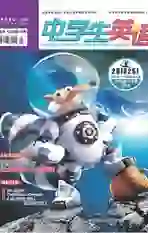新目标英语八年级(下)重点词语辨析
2016-05-14张祖平
张祖平
1. used to do和be used to doing
used to do意为“过去做某事”,后面接动词原形。例如:
He used to like junk food. 他过去喜欢吃垃圾食品。
be used to doing意为“习惯于做某事”,后面接动词-ing形式。例如:
He is used to getting up early. 他习惯于早起。
2. die, dead和death
die是动词,其过去式为died,现在分词为dying,可作形容词,意为“垂死的”。例如:
The old man died after a long illness. 那个老人病了很久之后死了。
Im afraid we couldnt save the dying dog. 恐怕我们不能救那条快要死了的狗。
dead为形容词,意为“死掉的”,其反义词为alive。例如:
We dont know whether he is alive or dead. 我们不知道他是死是活。
The dog has been dead for two hours. 那条狗死了已经两个小时了。
death是名词,意为“死亡”,其反义词为birth。例如:
The dogs death made us very sad. 狗的死亡使我们很难过。
3. interest, interested和interesting
interest可作名词,其复数为interests。例如:
He has an interest in math. 他对数学有兴趣。
interest还可作动词,意为“吸引人”。例如:
The movie didnt interest me at all. 电影一点都没吸引我。
interested常用来形容人,interesting常用来形容物。例如:
We are very interested in the interesting movie. 我们对这部有趣的电影很感兴趣。
4. pass和past
pass为动词,意为“通过;经过;传递”。例如:
Youll pass a bank on the way to the bus station. 在你去公交站的路上,你会经过一家银行。
He didnt pass the exam. 他没有通过考试。
He passed the ball to Tom. 他把球传递给了汤姆。
Six years have passed since I moved to Beijing. 我搬到北京,已经六年了。
past是介词,意为“经过;超过”。例如:
Three boys went past us on bikes. 三个男生骑车从我们身边经过。
He got up at half past six this morning. 今天早上他六点半起床。
5. borrow和lend
borrow为动词,意为“借进来”。例如:
I borrowed a book from him yesterday. 昨天,我向他借了一本书。
lend为动词,意为“借出去”。例如:
He lent a book to me yesterday. 昨天,他借给我一本书。
6. excite, excitement, excited和exciting
excite是动词,意为“令人激动”。例如:
The good news didnt excite him at all. 好消息并没有令他激动万分。
excitement为名词,意为“激动”。例如:
The news caused great excitement among her friends. 这个消息令她的朋友们激动万分。
excited为形容词,常用来形容人。例如:
He was very excited to see his old friends. 他看到老朋友很激动。
exciting为形容词,常用来形容物。例如:
We had an exciting game yesterday. 我们昨天举行了一场激动人心的比赛。
7. smile和laugh
smile可作名词和动词,意为“微笑”。例如:
She had a big smile on her face. 她脸上挂着灿烂的笑容。
She smiled to us and went away. 她朝我们笑了笑,然后走开了。
laugh为动词,其名词为laughter,意为“放声大笑”。例如:
Laughter is the best medicine. 笑是最好的药。
laugh at意为“嘲笑”。例如:
We shouldnt laugh at others. 我们不应该嘲笑别人。
8. succeed, success, successful和successfully
succeed是动词,意为“成功”,其过去式是succeeded。例如:
He succeeded in building the house himself. 他以一人之力成功地造了这个房子。
success为名词,意为“成功”。例如:
The dinner party was a great success. 这次晚宴非常成功。
successful为形容词,意为“成功的”。例如:
He is a successful man. 他是一个成功的男人。
successfully为副词,意为“成功地”。例如:
He passed the exam successfully. 他成功地通过了考试。
9. danger, dangerous和endangered
danger是名词,意为“危险的事”,常见词组为in danger。例如:
The old bridge is in danger. 老桥处于危险之中(要塌了)。
dangerous为形容词,意为“危险的”。例如:
That kind of snakes are very dangerous. 那种蛇很危险。
endangered为形容词,意为“濒危的,处于危险的”。例如:
We should protect the endangered animals. 我们应该保护濒危动物。
10. between和among
between意为“两者之间”,常用between... and结构。例如:
Do you know the differences between American English and British English? 你知道美式英语和英式英语之间的不同点吗?
among为介词,意为“……之间”,常指三者或三者以上。例如:
There is a red house among the trees. 树林之中有间红房子。
11. be full of和be filled with
两者都是“充满”的意思,不过be filled with侧重于动作和装的东西,而be full of侧重于状态。例如:
The library is full of books. 图书馆里满是书。
The box is filled with books. 箱子里充满了书。
12. most和mostly
most为形容词,意为“大部分的”。例如:
Most students hope to have their own cellphones. 大部分学生都希望有自己的手机。
mostly为副词,意为“大部分地”。例如:
Were mostly out on Sundays. 我们周日大部分都外出了。
13. notice和realize
notice意为“注意”,往往指眼睛看到。例如:
He didnt notice the change of Toms haircut. 他没有注意到汤姆的发型变化。
realize意为“意识到”,往往指认清一种形势。例如:
Suddenly I realized I was lost. 突然,我意识到自己迷路了。
14. true, truth和truthful
true为形容词,意为“正确的,真实的”。例如:
The movie is based on a true story. 电影基于一个真实的故事。
truth为名词,意为“真相”。例如:
Do you think shes telling the truth? 你认为她在讲真话吗?
truthful为形容词,意为“诚实的,真诚的”。例如:
I think that is a truthful answer. 我认为那是一个诚实的答案。
15. raise和rise
raise为动词,意为“筹集”。例如:
The volunteers work hard to raise money for poor kids. 志愿者努力工作,筹钱帮助穷孩子。
rise为动词,意为“上升”。例如:
Smoke rose from the fire. 烟从火中起。
16. allow和let
两者都含有“让;允许”的意思,但allow的结构是allow somebody to do something。
His parents wont allow him to stay out late. 他的父母不允许他在外面待得很晚。
allow还常常用于被动语态的句子中。例如:
You are not allowed to bring your cellphones to school. 不允许你们带手机来学校。
let的结构是let somebody do something。例如:
Let me have a look at your new car. 让我看一下你的新车。
17. elder和older
elder指同一个家庭中年龄较大的一位。例如:
My elder brother bought a new car lat week. 我的长兄上周买了辆新车。
older是old的比较级,意为“比……年龄大”。例如:
Tom is older than Bob. 汤姆比鲍勃年长。
18. beat和win
beat是动词,意为“打击;打败”,常用结构是:beat someone。例如:
He beat me at chess yesterday. 昨天他下国际象棋赢了我。
Tom was beaten by his father because he didnt pass the exam. 汤姆被爸爸打了一顿,因为他考试没通过。
win是动词,意为“赢得;获胜”,常用结构为:win something or someone。例如:
He won the first prize in the running race. 他在跑步比赛中赢了一等奖。
19. surprise和surprised
surprise可作名词,常见词组为in surprise, to ones surprise。例如:
He looked at me in surprise. 他惊讶地看着我。
To our surprise, he has four cars at home. 令我们惊讶的是,他家里有四辆车。
surprise也可作动词,意为“令人惊讶”。例如:
His good grades didnt surprise us at all. 他的好成绩一点也没让我们惊讶。
surprised意为“惊讶的”,常形容人;而surprising意为“令人惊讶的”,常形容物。例如:
I am surprised at the surprising news. 我对这个意外的消息感到惊讶。
20. offer和provide
两者都有“提供”的意思。offer常用结构是:offer something to somebody和offer somebody something。例如:
They decided to offer the job to Tom. = They decided to offer Tom the job. 他们决定将工作提供给汤姆。
provide常用结构是:provide something for somebody和provide somebody with something。例如:
That kind man always provides free food for the poor kids. 那个善良的男人总是把免费食物提供给穷孩子。
Farmers provide us with rice. 农民为我们提供粮食。
